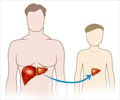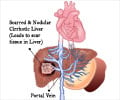Crigler-Najjar Syndrome occurs when the enzyme that normally converts bilirubin into a form that can easily be removed from the body does not work correctly.

The syndrome runs in families (inherited). A child must receive a copy of the defective gene from both parents to develop the severe form of the condition. Parents who are carriers (with just one defective gene) have about half the enzyme activity of a normal adult, but do not have symptoms.
Lifelong light treatment (photo therapy), blood transfusion and liver transplant are used for CNS treatment.
The 14 year old resident of Oshiwara, YashRanjit was detected with CNS, 14 days after he was born and was on photo therapy since then. Yash had to undergo daily photo therapy for 6 hours a day which increased to 12-14 hours a day as he grew up, to keep his bilirubin under control; else he would have suffered brain damage.
Yash’s parents were very disturbed with his condition, but were reluctant to undergo a liver transplant due to various reasons and fear. They imported a photo therapy machine to keep Yash under light. Due to this condition, Yash could not lead a normal life like other children of his age, as he had to compulsorily take photo therapy, and was confined to the four walls of his home.
During this course, one day Yash got seizure and his parents could not see the plight of their son. That’s when they decided to go for liver transplant. It was not an easy choice for the parents. Both his parents turned out to be unfit for a liver donation. They were in a state of flux, and then his aunt came forward and agreed to donate part of her liver to Yash.
Advertisement
Prof. Mohamed Rela, Group Director, Institute of Liver Diseases, HPB Surgery and Transplantation said, “Auxiliary liver transplant is a complex procedure, unlike a normal liver transplant, wherein a complete liver is transplanted. The procedure is a technically demandingone. In this we remove a part of the liver and replace it with a part of the donor liver. Once the patient’s own liver regenerates, then the need for donor liver no more exists. In most cases, the donor liver shrinks and becomes a small tissue. In some, another surgery is needed to remove it.”
Advertisement
Dr. ParijatGupte, Consultant Hepatologist, Hepatology, Institute of Liver Disease HPB Surgery and Liver Transplantation Global Hospitals, Mumbai said, “The patient was on high risk of getting severe brain damage due to the high bilirubin levels, had he been not operated upon quickly. As soon as Yash came to Global Hospitals, the doctors decided to perform auxiliary liver transplant, as it was the only option to save him. The patient is doing good and has been discharged from the hospital and will be able to lead a normal life hereafter.”
Yash’s liver transplant took place on 28th May. During the surgery a portion of Yash’s liver was removed and replaced with a small portion of his aunt’s liver. Post –operative complications were managed by liver intensive care team.He got discharged on 10th June with a normally functioning liver.
Also known as Auxiliary Partial Orthotopic Liver Transplantation (APOLT); the procedure entails attaching part of a donor liver to the failing liver in the recipient, where it supports the patient, clears toxins, and prevents brain injury during recovery. After the patient’s native liver recovers, the donor liver withers in most patients and the majority of patients are able to withdraw from immunosuppressant medications.
The expert team of doctors comprised Dr. Samir Shah, Dr. GuruprasadShetty, Dr. Somnath Chattopadhyay, Dr. Vishal Sachde Dr. Akash Shukla and Dr. Vaishali Solao. Yash’s parents are extremely thankful and relieved post the surgery and are very happy with their decision.
Source-Medindia















